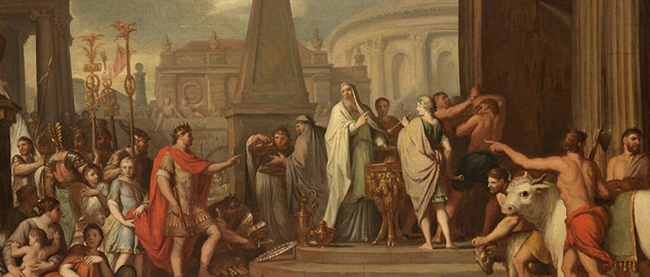Augustus: First Emperor of Rome
Posted on 13th May 2021
With Cicero, Cassius, Brutus, Mark Antony and Cleopatra all dead the 33-year-old Octavian was now the single most powerful man in the known world. No individual it seemed was in a position to challenge his authority only the Senate now stood in the way on his path to supreme power.
Although he was no warrior and doubt had been cast on his physical courage, it being said that he had never personally shed the blood of another not a recommendation for a Roman man of noble blood, he was nonetheless utterly ruthless and in the knowledge that there were always others who would do the killing for him he was to prove a difficult man to oppose.
Octavian did not return to Rome until August 29 BC, a full year after his great victory in Egypt and to a rapturous reception. He had avenged Caesar, defeated the witch Cleopatra brought the years of Civil War to an end. All the people now wanted, was peace and prosperity, and he appeared to be the only man who could both provide and guarantee it.
Praised in the Senate he was reappointed Consul without opposition as was to be every year until 23 BC, when it ceased to be required.
Lauded by the nobility and popular with the people Octavian could have been forgiven a little hubris but he had learned the lessons of his great-uncle Julius Caesar, whose name he now proudly bore. He too had been popular only to be laid-low by a handful of treacherous Senators who believed he was a tyrant they were the very same people he thought were his friends and whose loyalty could be taken for granted.
Unlike Caesar then, Octavian while never loosening his grip on power would be seen to rule by consent.

In 27 BC, Octavian announced to the Senate that he intended to relinquish power. He told them: "The fact that it is in my power to rule over you for life is evident, but I am mild by nature and have no desire to dominate. The power I have now I lie down. Allow me to live out my life in peace."
It was good politics, for he knew there were those in the Senate who wished to seize power for themselves but that the majority fearful of the civil war that would likely result from any power vacuum would oppose his resignation. He was right, and they begged him to remain and even agreed to increase his powers and appoint him Dictator for the next ten years.
He was now effectively sole ruler and de facto Emperor, though he refused to be referred to as such during his lifetime preferring the title Princeps Civitas or Principal Citizen.
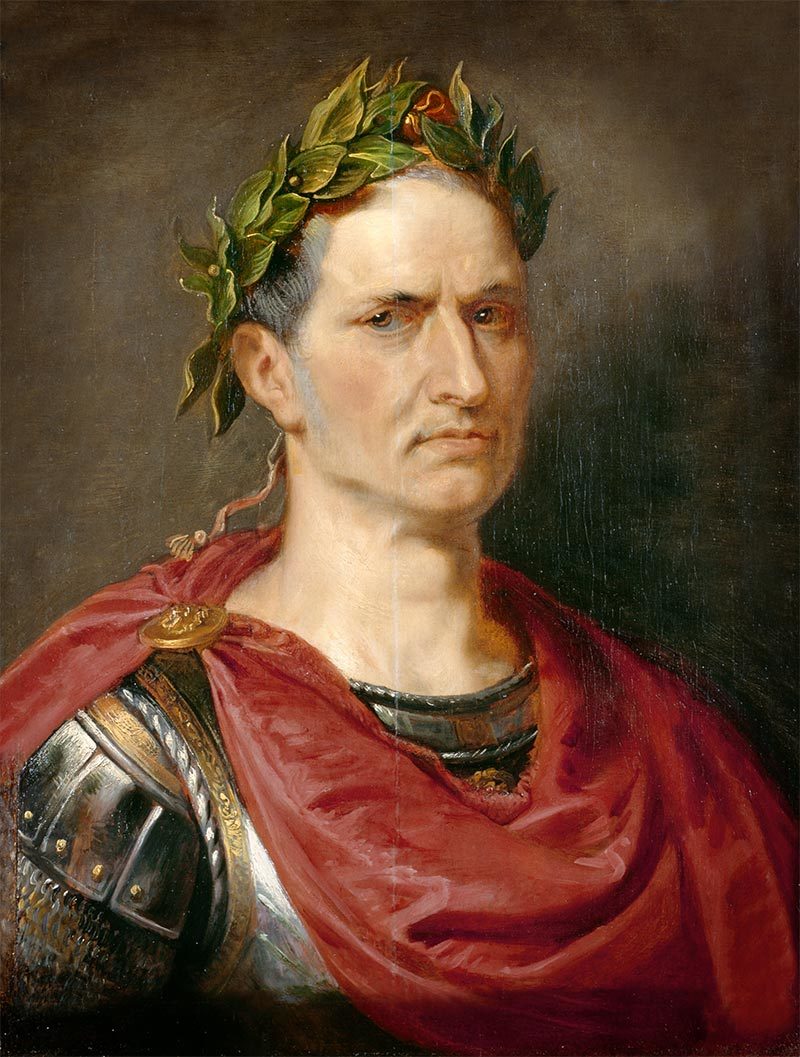
On 16 January 27 BC, he was awarded the title Augustus or Illustrious One and a month of the year was renamed in his honour. To consolidate his power, he now created his own private army, one that owed loyalty only to him - the Praetorian Guard. But he remained careful throughout to ensure that the power he secured was voluntarily conferred upon him by the Senate and people of Rome and even after he had been appointed Dictator, he modestly maintained that he would only govern the provinces while the Senate ruled in Rome. Yet even though, his creation of the Praetorian Guard said otherwise his public persona remained one of a man for whom power was a burden that brought with it a weight of responsibility which he did not seek for its own sake.
In the winter of 39 BC, Octavian was introduced to the 20-year-old Livia Drusila, a slim, diminutive young woman who did not possess the fully rounded figure that was considered attractive in Roman society but was nonetheless very pretty. She had been married since the age of 15 and was already the mother to a son, Tiberius, and was pregnant with her second child, the future Germanicus.
For most of her life her family had been on the wrong side of history, both her father Marcus Claudianus, and her husband Tiberius Claudius Nero had supported Pompey in his conflict with Julius Caesar and later fought in the army of Cassius and Brutus.
Following the defeat and death of Pompey her father had committed suicide, but her husband had returned to Rome and requested clemency which had been granted.
Livia, with her noble bearing, was a resourceful woman who was not in the least cowed by her diminished position as the daughter and wife of traitors. She had her name, beauty, and wits, and was more than willing and capable of using all of them to get what she wanted and secure the future for herself and her children. Octavian, who was not known to be either an emotional or a sentimental man seems to have been smitten with Livia from the first time he met her.
At a time when marriage among the Roman elite was just another means by which to acquire wealth, status, and power there appears to have been little political advantage in Octavian marrying Livia, but he was nonetheless determined to do so. He ordered her inconvenient husband to divorce her which given his parlous state and the likelihood of death should refuse he agreed to.
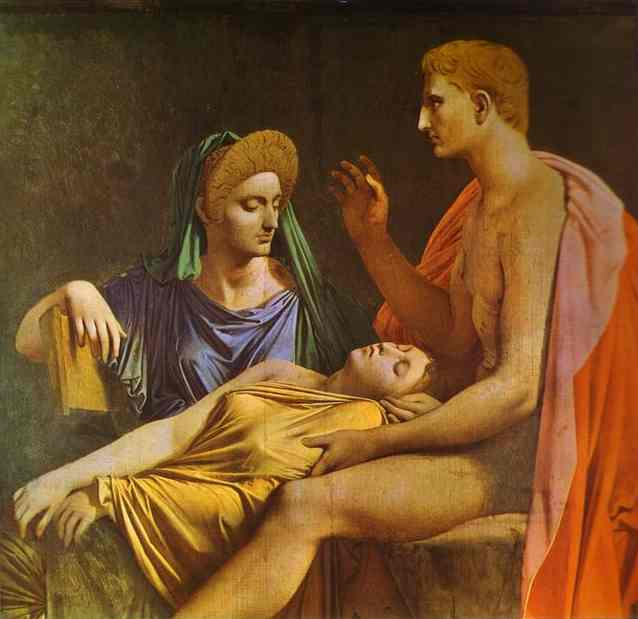
On 14 January 38 BC, Octavian divorced his own wife Julia Scribonia who he complained nagged him on the same day that she gave birth to their daughter Julia. Three days later he married Livia. They were to remain married for the next 51 years and go on to form one of the most remarkable working partnerships in history.
The recently acclaimed Augustus was determined to remake Rome in his own image and he and his own family would set the standard by which the rest of Rome would be judged; and so, wishing to be seen as a man of simple taste and little pretension he resided at a modest villa on the Palatine Hill and rarely entertained. The historian Suetonius wrote that: "As a rule he preferred the food of the common people. He ate the coarser kind of bread, white bait, hand-pressed cheese, and green figs. He rarely drank and slept on a camp bed.”
The image of the simple man merely doing his duty was one he was careful to cultivate throughout his life even if it was perhaps not entirely true. He may never have appeared in public garishly dressed but he was nonetheless notoriously vain. No statue or bust of him appeared throughout his life that did not portray him in the full-vigour of youth, and that despite being physically unimpressive this provided him with an almost divine-like status. He was also careful to always appear graceful, moving slowly, and rarely raising his voice. Suetonius described him thus: "He had clear bright eyes, his teeth were small, few and decayed, his hair yellowish and curly, and people did not realise how small a man he was."
It was also said that he could bear neither the extremes of heat nor of cold and that his body would become covered in spots and blemishes as a result. He was also terrified of thunder and lightning and would choose to hide in a sealed room during a storm of any ferocity.
He also rarely missed the opportunity to take the moral high ground. He publicly praised the fidelity of Roman womanhood, condemned adultery, passed laws in favour of marriage and made divorce more difficult. In all this he had a willing accomplice in his wife Livia.
She too disavowed the wearing of jewellery, dressed modestly and busied herself with the running of her household like all good Roman women should. It was even said that she made the emperor’s clothes for him. But she also carried out official duties on his behalf, greeting foreign emissaries addressing women's meetings, and taking an active role in the affairs of the Vestal Virgins. She very soon became the model of the Roman Matriarch. But all was not as it seemed.
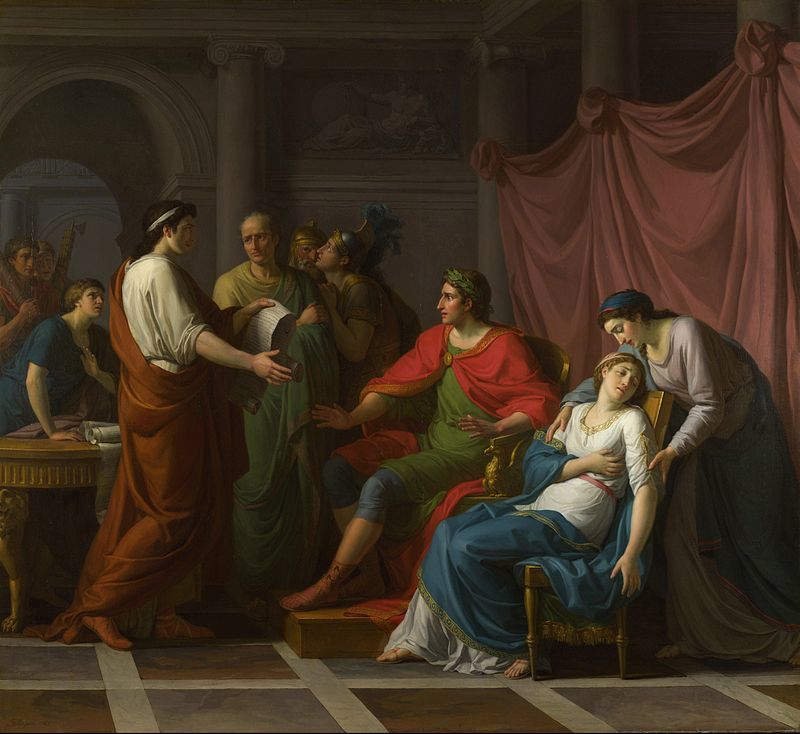
The pasty-faced, short, and pitifully thin Emperor had taken to rouging his cheeks, wearing built-up sandals and extra layers of clothing to give him more bulk. He was also a serial philanderer who enjoyed nothing more than to humiliate Senators by forcing their wives and daughters to sleep with him, though his friends were to say that this he did merely for reasons of state and to discover the secrets of his enemies.
Despite his many adulteries Augustus's marriage to Livia remained strong and it was said that he was in awe of his Empress. Once asked how she managed to control such a powerful man she replied: "I remain chaste, do whatever he asks of me, and turn a blind eye to his many passions."
At no time during their long life together did Augustus ever contemplate divorcing his wife despite her failure to provide him with a son and heir. Indeed, so close were they that they were to become effective co-rulers.
Livia conversed with foreign dignitaries often making decisions on her husband's behalf and besides administering to religious affairs she also ran Rome during the Emperor's many absences from the city - she had the free use of the Imperial Seal. Only in military matters was she excluded from the decision-making process. But she was more than the devoted helpmate of her husband however, she also had ambitions of her own.
Augustus had no direct heir and Livia was beyond child-bearing age even so she was determined that one of her sons, either Drusus or Tiberius, should succeed him. But Augustus had already alighted upon his nephew Marcellus. When this seemingly healthy and robust young man inexplicably died, apparently of food poisoning, Augustus was distraught. But his death did not move Livia's sons up the pecking order. Instead, Augustus looked to the sons of his daughter, Julia.
Julia had been married to Augustus's oldest friend and right-hand-man, Marcus Vipsanius Agrippa. The marriage had been a controversial one for not only was Agrippa twenty-five years Julia's senior, but he was also of low birth. However, another childhood friend, Macaenas had told him: "You have made him so great that he must either be your son-in-law or be slain."
Augustus had chosen the former option and it was to prove a happy union with Julia having four children by Agrippa - Lucius, Gaius, Postumus, and a daughter, Agrippina. All three of the boys would be next in the line of succession before either of Livia's children could even be considered. When Agrippa died suddenly and unexpectedly in 12 BC, Augustus adopted the two oldest boys and began grooming them for power. Livia, in the meantime, petitioned Augustus for the recently widowed Julia to be married to her son Tiberius, her other son Drusus had since died.
Augustus was reluctant to consent to this not so much because he objected to Tiberius marrying into the Imperial Family, he just didn't like him. Though he had proved himself hard-working, a good soldier and a capable administrator he was also an ill-tempered and melancholic man whose brooding presence Augustus found depressing and objectionable.
But Livia remained insistent and for the sake of marital harmony if nothing else he reluctantly yielded to her demands. Tiberius was equally reluctant to divorce his own wife Vipsania Agrippina with whom he was very much in love and had to be made to do so.
In no time at all Tiberius and Julia came to loathe one another. His sexual proclivities already went some way beyond the parameters of the marriage bed, and he never forgave Julia for being the person responsible for him having to divorce the only woman he ever loved. She never forgave him for his lack of sexual interest in her and the marriage suffered accordingly. Julia was also no friend of Livia's. She thought her overbearing, condescending and manipulative while Livia saw her as an impediment to her ambitions.
In 2 BC, Julia became embroiled in a sexual scandal that brought shame upon the Imperial Family when it was revealed, though by who exactly remains a mystery that she had been sleeping around, not just with Senators and prominent Roman citizens, but with slaves and even gladiators. That she had in fact been behaving like a common whore.
Augustus was furious beyond reason, for years he had promoted family values, he had passed laws designed to improve Roman morals and had carefully cultivated both his and his own family's image. Now he had been betrayed by his own daughter - Julia was arrested on charges of adultery and treason.
Despite the promptings of Livia, Augustus was disinclined to order the execution of his own daughter. Instead, he banished her and it was to be a harsh banishment.
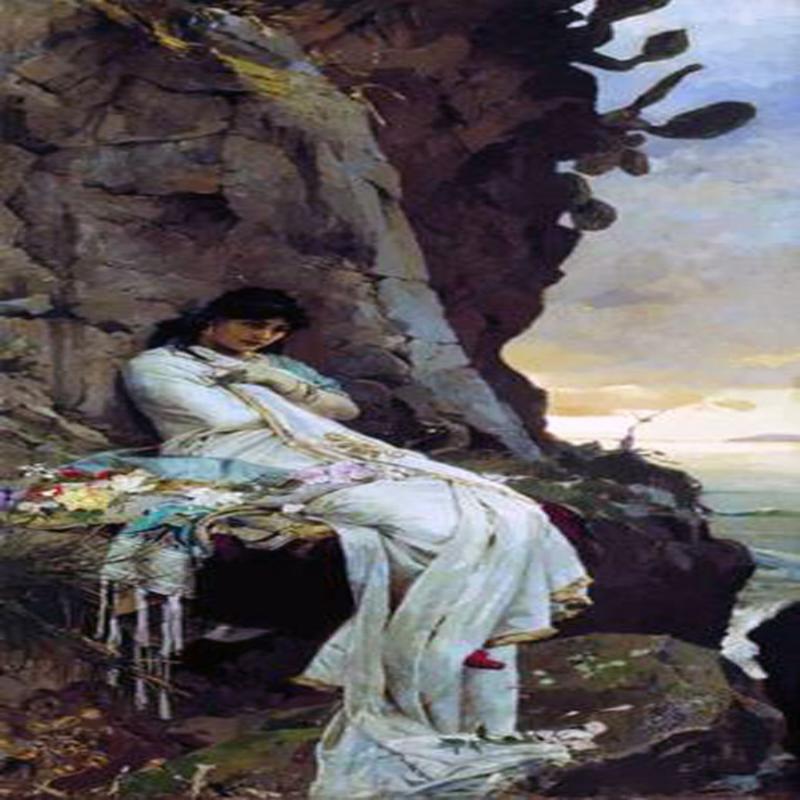
SShe was exiled to the Island of Pandeteria which was little more than a mile in circumference. She was denied wine and any male companionship but at least she wouldn’t be alone. Her mother, Scribonia, was exiled along with her for having given birth to such a whore. Five years later she was permitted to return to Italy but barred from ever leaving the region of Reggio di Calabria. She never saw Rome or her father again and was later starved to death on the orders of Tiberius after he became Emperor.
Not long after Julia's banishment her two young sons Gaius and Lucius both died in mysterious circumstances, the former in a boating accident, the latter of food poisoning. This just left Postumus as Augustus's heir apparent, and he was neither popular nor respected. As the third son little had been expected of him other than perhaps a career in the army and the prerequisite that he, behave responsibly - he had delivered on neither.
He was arrogant, rude, often drunk and whoring his way around the city he offended almost everyone he encountered. Nonetheless, following the premature death of his older brothers Augustus had nowhere else to turn. In 4 AD, he adopted him as his son and legitimate heir. Also, at the insistence of Livia, should anything happen to Postumus, he adopted Tiberius.
In AD 9, Postumus was accused of trying to rape his niece Livilla. Given his reputation it was an accusation easy to believe, and certainly Augustus did. As a result, Postumus was banished to the tiny Island of Planasia where he was kept under constant guard.
During the long reign of Augustus Rome experienced unparalleled prosperity and the borders of its Empire expanded massively; modern day Spain, Portugal, Bavaria, Switzerland, Austria, Hungary, Croatia, Serbia, Slovenia, Albania and north Africa were all absorbed into the Empire. Trade links were established, the taxes rolled in, and commerce boomed. But the Pax Romana that had been created was about to be challenged in the most brutal and savage way and for the first time the Rome of Augustus would be made to question its own vulnerability.
In the late Autumn of 4 AD, the Governor of Germania, Publius Quintilius Varus marched his entire army, three legions, a cavalry detachment, and 6 cohorts of auxilaries more than 20,000 men, into the Teutoburg Forest and straight into a trap set for it by Arminius, the Chief of the Cherusci Tribe.
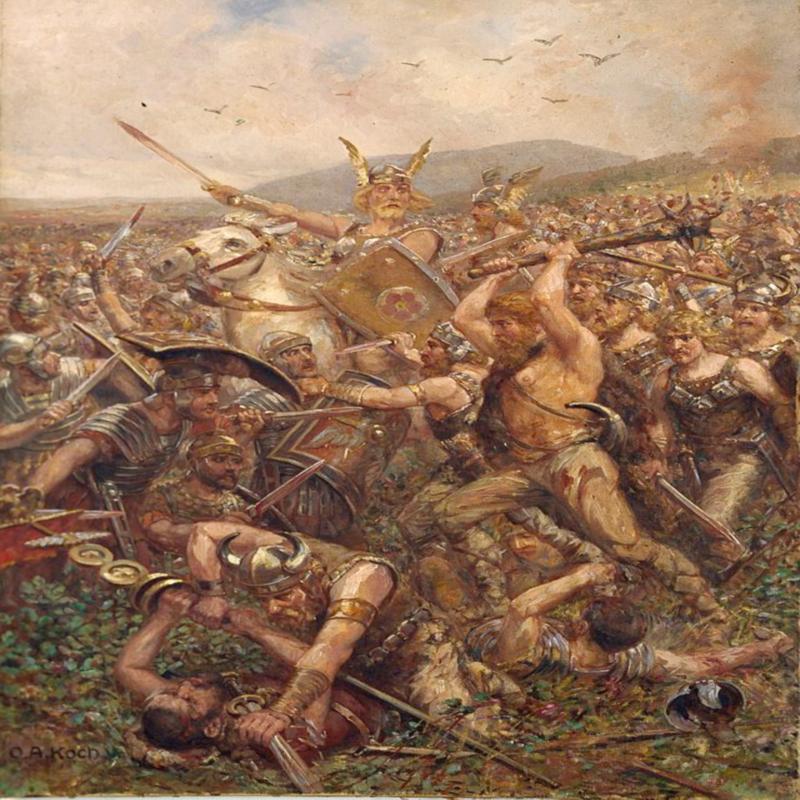
In the dark, fearful forest shrouded in mist and in a torrential downpour the Roman Army was wiped out and Varus forced to commit suicide. When the news reached Rome it wasn't at first believed but as the facts were confirmed it had a traumatising effect as the people struggled to come to grips with the thought of a professional Roman army being destroyed by heathen savages. The city went into deep mourning.
But one was more traumatised than Augustus himself: "He was so greatly affected that for several months he cut neither his beard nor is hair, and sometimes he would dash his head against a door, crying Quintilius Varus, where are my Eagles!"
Augustus sent Tiberius to shore up the western border and later dispatched Germanicus, the son of Mark Antony's daughter Antonia on a punitive mission to teach the German tribes a lesson and recover the Eagles. He did both but from that moment on the Roman Empire's northern border never stretched beyond the eastern bank of the Rhine.
The last years of Augustus's life were spent as a man haunted by the events of his past. Saddened by the death and banishments of so many of his oldest friends and family he could find little peace and wandered the corridors of the Imperial Palace at night unable to sleep. As an old man he also had to endure the many ailments that come with advanced age. He was hard of hearing, walked with a stoop and suffered terribly from the cold. Indeed, his fingers were often so numb that he was incapable of writing, and it was said that in, “winter he wore no fewer than four tunics and a heavy woollen gown over his undershirt."
He also turned a deaf ear to the rumours sweeping the Imperial Court that Livia had been in some way responsible for the ill-fortune that had beset his family in the latter years of his reign; for gossip was rife that she displayed an unhealthy interest in poison and was determined that her son Tiberius would succeed to the Imperial Throne and no one else.
On 19 August AD 14, aged 78, Augustus, Rome's first Emperor died. His last words: "I found Rome of clay and leave her too you of marble. If I have played my part well then applaud my exit from the stage."
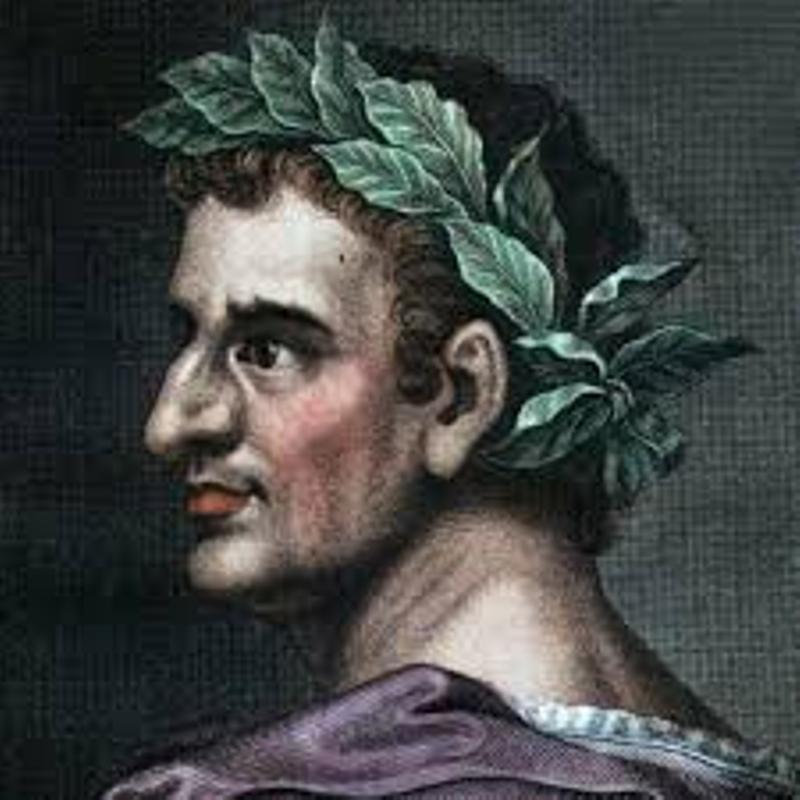
Following Augustus's death the Senate summoned Tiberius and offered him the Imperial Throne as Augustus's adopted son and nominated heir. Initially, he refused it much like the young Octavian had done so many decades before. But just like Octavian it was merely a ploy to force the Senate to yield even further powers. Three days after accepting the Senate's renewed offer and becoming Emperor he had the exiled Postumus murdered.
In his Will, Augustus had Livia adopted into the Julian Clan, left her one-third of his personal fortune and provided her with the honorific title of Augusta. This guaranteed her patrician status for the rest of her life and made her untouchable. Tiberius was also to make any criticism of his mother a treasonable offence punishable by death.
Despite her own advanced old age Livia remained determined to rule alongside her son as she had her husband, and for a few years this seemed to work quite well, but the always brooding and ill-tempered Tiberius soon began to tire of his mother's constant meddling. Whenever they disagreed on an issue, she would be quick to reproach him with “were it not for me you would never have been Emperor." Their mutual loathing for one another merely increased over the years. When the Senate proposed a motion to formally make Livia - Mater Patriae, or Mother of the Nation - Tiberius vetoed it.
In AD 26, Tiberius retired to the Island of Capri. It was suggested at the time that it was to get away from his domineering mother, but it was in truth so that he could indulge his increasingly perverted sexual cravings away from the public gaze.
In his absence effective power in Rome fell to the Commander of the Praetorian Guard Lucius Aelius Sejanus, and Livia's influence as a result waned.
In AD 29, aged 86, Livia Augusta, Empress of Rome died. Alongside her husband Augustus she had dominated Roman life for more than 60 tears and tears were wept openly on the streets at her passing, shops were closed, even Rome's bawdier entertainments were put on hold as the entire city mourned the loss of its Queen and Empress but not so her son who refused to return to Rome for her funeral.
His mother's body was preserved for a number of days in the expectation that he would at some time arrive to pay his last respects, but he never did. In the end her body had to be buried because of the dire state of the corpse.
Thirteen years later her nephew, the Emperor Claudius, had her declared a God in a formal ceremony, a last tribute that had been denied to her by her own son.
Tagged as: Ancient & Medieval
Share this post:





